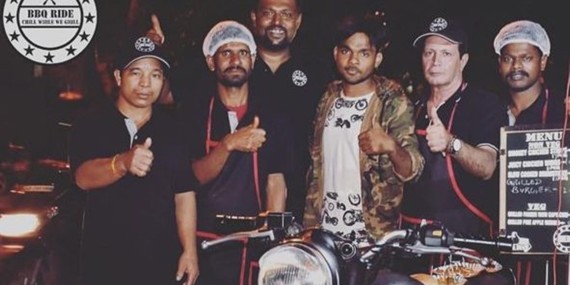Arun Varma, Co-founder of BBQ Ride India emphatically concerns regarding the widespread awareness of No Sir No Madam drive in India. BBQ Ride India is India’s first food bike chain. They have taken the Royal Enfield bike and converted into a food truck. They operate in Bengaluru and aim to take over the numerous cities with their innovative idea.
Arun along with his brother, were inspired by the food truck fad happening in Bengaluru. However, they noticed a few difficulties that the truck owners were facing. Consequently, they came up with an idea to convert a bike into a food truck by attaching a grill, in place of the side-car. Thus, solving a lot of issues that the truck owners faced.
Being from an army family, Arun is no stranger to salutation decree. Although, in his company, he has instilled No Sir No Madam habit into his employees.
He mentions — We started our venture right after college. Subsequently, a lot of my team members were of my age. Hence, we did not want to follow ‘Sir/Madam’ culture as it creates a hierarchical environment in the office. Moreover, we have employees older than me working for us. I would feel awkward, if they addressed me as Arun Sir.
To maintain equality in his firm, Arun has given the first-name freedom to his employees. The older employees refer Arun by his first-name, and the younger employees address him as ‘Bhaiya’. Arun reciprocates to his employees with the same respect he holds for himself.
“Furthermore, a salutation ridden custom at the workplace enables the employees to express their ideas. In any organization, every single person has special skills that can be used for a specific task. Therefore, imposing salutation tradition on employees restricts them from sharing their views and opinions,” adds Arun. With more and more startups establishing in Bengaluru, he is happy that the ‘Sir/Madam’ culture is slowly eradicating from Bengaluru.
In continuation, he sheds light on the practices of officials in public offices. Arun states — I do not understand why we have to bow down in front of the bureaucrats to get our work acknowledged by them. Government employees are assigned to serve the public and are even paid for that. Demanding people to refer them with a salutation is just a misuse of their authority.
He narrates, “I remember we had to travel to Mysore for an event, regarding our work. We were stopped by the officers at a check post for some questioning. They continued to hold us, even after we had explained them the reason for the modification of the bike. Those officials without any concern ignored our plea to let us go as we were getting late. Instead, they kept indicating for bribes in order to release us.” Such incidents happen all across India. Eradicating salutation edict would take away power from people in authority to exploit the public, opines Arun.
He stumbles on the condition of blue-collar workers while contemplating the ill-effects of ‘Sir/Madam’ tradition. Arun voices “People in India are judged and treated on the basis of their financial background. Such perceptions have led to more disparities in society over the years. We should instead respect people for their ethics and manners.
Abolishing ‘Sir/Madam’ order would also help get rid of taboos that people equate lower-economic demographic with.”
Arun surmises that educating people about No Sir No Madam is crucial. Hence, he suggests to implement first-name habit into schools and colleges. Students learn about mannerism and behavior in schools; thus, they should be taught about No Sir No Madam doctrine as well.
This would empower the kids not to let anyone senior impose any ascendancy onto them. He reminisces over an instance where his father’s senior ordered him to carry out some work. Arun boldly replied to the person that he does not work for him and has his own identity.
In the end, Arun urges to spread awareness about No Sir No Madam in corporate offices to instill this change quicker. Moreover, he conveys “Respect and treat people for who they are and give importance to talent and not influence.”







Add comment